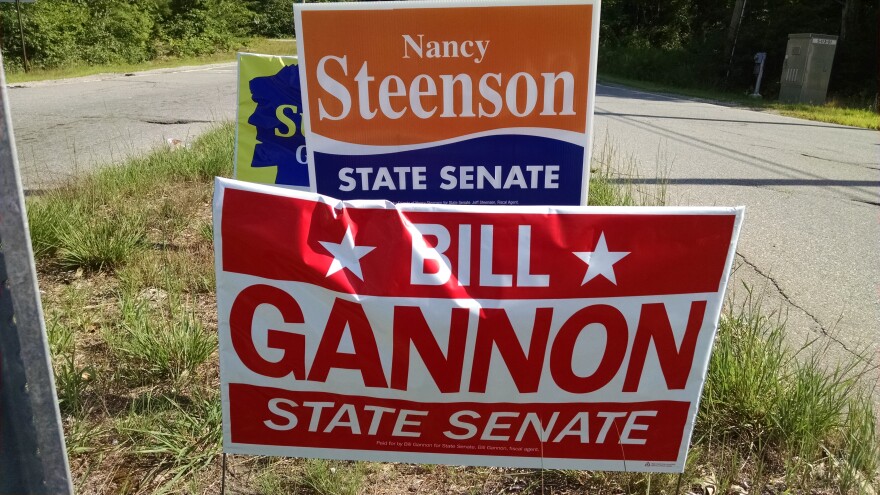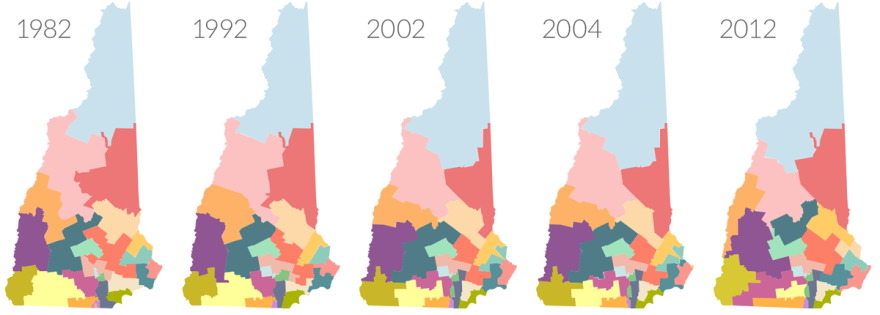One-third of New Hampshire’s 24 senators are retiring this year, leaving 8 vacant seats. That’s a lot by recent standards, and it puts a big question mark over New Hampshire politics after Election Day. But those state Senate races haven’t exactly been in the spotlight in this busy election season.
Even the candidates acknowledge it.
"If you ask people who the candidates for state Senate are in their district, in any district in this state, they’d be hard-pressed to tell you," said Nancy Steenson, a Republican from Danville who's running for the District 23 state Senate seat.
There are actually several competitive races for state Senate across New Hampshire this year, which could determine control of the State House in 2017. Look back over just the past few legislative sessions, and you quickly see why this statewide tug of war is so important this year.

It’s the Senate where New Hampshire’s most far-reaching policy decisions – and the ones most likely to affect your daily life -- have been settled: the state budget, Medicaid expansion, cuts to business taxes. In each case, the final outcome was largely determined by the votes of those 24 senators.
Related story: In a Tight State Senate Race, What Does Trump Have to Do With Anything?
Curtis Barry, a lobbyist in Concord for two decades, says the state Senate, rather than the 400 member House, has often been the place for good old-fashioned deal-making.
"Because there are fewer of them, the vote of each one of them is far more important," Barry said. "It necessitates more compromise, more reaching across the aisle.

Compromise, reaching across the aisle. That’s not the tone of this campaign season, at least not at the national level. So here’s the question facing state Senate candidates: how do you get voters to see that these down-ballot races matter?
Rich Killion, a consultant who’s advising the GOP’s Senate political committee, has a simple message for his party’s candidates this year: keep it close to home.
“There seems an unease in both parties, a lack of universal support for the top of the ticket," Killion said. "And that lends to what always works in New Hampshire, which is, local candidates should run local races.”
Killion says by limiting their pitches to bread-and-butter issues – taxes, spending, public schools – candidates can pierce through the noise of the national debate.
“That’s a great thing for the candidates, because they can focus in their own district, whether it’s Exeter or whether it’s Enfield, and they can focus on those voters locally,” Killion said.
And it’s costing more to get those voters to pay attention. Since 2004, Senate candidate spending has jumped by more than 50 percent. In the last election, several candidates spent more than a quarter million dollars on their races. That’s not counting money spent by outside special interest groups. Or cash spent by the political parties, which have raised more than half a million dollars so far this year.

Gene Martin of the New Hampshire Democratic Party said serious candidates nowadays need a more polished – and costlier -- approach to win.
“We really focus on running professional campaigns," Martin said. “For a long time, I think, the State Senate was a pretty easy thing. You could maybe raise $30,000. Now out candidates are raising $100,000 to $200,000 and running really competitive, sophisticated races. They have mail programs, they’re talking to voters.”
Targeted phone banks and advertising efforts, signs, brochures, campaign web sites -- as candidate Nancy Steenson has found, it adds up.
"Literature costs money to print, signs cost money to order, mailings cost money," she said. "These kinds of things just cost a lot of money. And the more you raise, the more you can spend. And the more you spend, the more exposure you can have."

Sitting in his basement office across from the State House, Senator Dan Feltes has it easy this campaign season. He’s running uncontested for re-election. Feltes is a Democrat, so you might be surprised to hear him say: he’s sad to say goodbye to some of his retiring Republican colleagues.
Why? Listen to him tick through what he considers some of the biggest accomplishments of the past legislative session:
"Medicaid expansion…the heroin and opioid crisis…. affordable housing… energy policy."
In each case, the bills were bipartisan affairs, Republicans and Democrats teaming up. With this year’s GOP retirees, Feltes says, the Senate is losing some of its cross-aisle dealmakers.
“Some of the people that are leaving, retiring, some of the Republicans, were willing to work out deals, willing to compromise, if you had good arguments, if you had good policy ideas," Feltes said.

Those departing Republicans, like Nancy Stiles of the Seacoast, and David Boutin of Hooksett, have left busy races to replace them. They might end up being among the tightest Senate races this fall. Presidential years tend to be good ones for Democrats in New Hampshire, with more voters coming out to the polls. So the party has its eye on these battleground Senate districts.
Still, ask the candidates themselves, and they’ll tell you: it’s not easy to predict how the winds will blow in November. Especially with the wild race at the top of the ballot.
"That’s the million dollar question -- no one knows what to expect," said Maureen Barrows, of Exeter, another Republican running for the District 23 seat.
"I’m focused on what I can, or what I hope I can do, and what others in Concord hope they can do."
Voters get their first crack at the state Senate candidates on Primary Day, September 13.








